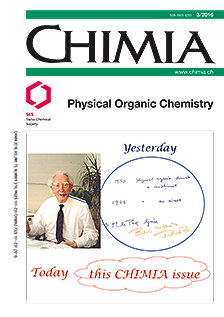Getting it Right: How DNA Polymerases Select the Right Nucleotide
DOI:
https://doi.org/10.2533/chimia.2016.203Keywords:
Dna polymerases, Dna replication, Hydrogen bonding, Modified nucleotides, Selectivity of dna polymerasesAbstract
All living organisms are defined by their genetic code encrypted in their DNA. DNA polymerases are the enzymes that are responsible for all DNA syntheses occurring in nature. For DNA replication, repair and recombination these enzymes have to read the parental DNA and recognize the complementary nucleotide out of a pool of four structurally similar deoxynucleotide triphosphates (dNTPs) for a given template. The selection of the nucleotide is in accordance with the Watson-Crick rule. In this process the accuracy of DNA synthesis is crucial for the maintenance of the genome stability. However, to spur evolution a certain degree of freedom must be allowed. This brief review highlights the mechanistic basis for selecting the right nucleotide by DNA polymerases.Downloads
Published
2016-03-30
Issue
Section
Scientific Articles
License
Copyright (c) 2016 Swiss Chemical Society

This work is licensed under a Creative Commons Attribution-NonCommercial 4.0 International License.
How to Cite
[1]
Chimia 2016, 70, 203, DOI: 10.2533/chimia.2016.203.







